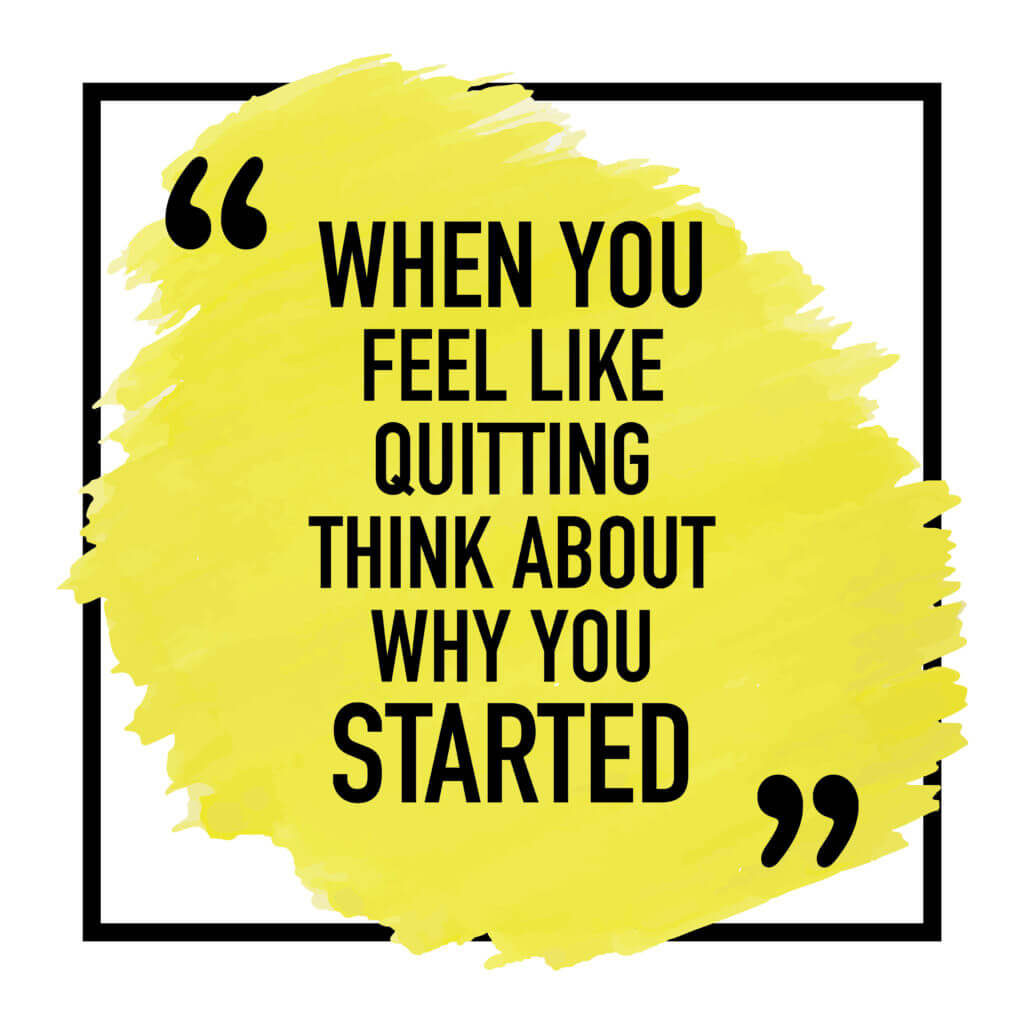Lately, I’ve been thinking a lot about control. Namely, how much of it we lack.
I’m sure I’m not the only one. If this crisis has taught us anything, it’s just how little power we have over outside factors.
As business owners, ideally, we plan and prepare for whatever comes our way by investing in our own company.
The plan we had in place for Miles allowed us to act fast with relatively minor interruptions to our operations. Still, no amount of planning could have prepared us for this.
Experience, however, has prepared us for anything.
Roughly ten years ago, we were facing a different economic crisis, and businesses across the nation took a major hit. I’ll tell you right now: I was scared. We didn’t know if the country would bounce back from this. Immediately, as a business, we went into defensive mode. We cut costs everywhere we could. We cut sales, we cut marketing. Our focus was on one thing and one thing only, and that was surviving.
We did survive, of course, but not without a large decline in revenue and significant job loss. As a business, it was like we’d been pushed back ten years. As a business owner, it was like a punch to the gut.

This time around, the biggest change is my perspective, and I want to help you avoid those mistakes I made many years ago. So, here are a few things I’ve learned along the way. I hope these will help you look at things in different ways, recognize the value in investing in your business, and find new opportunities to grow.
Don’t let fear dictate your decision making
First, I want you to stop worrying about the things you can’t fix. Remember that the economy will always have ups and downs, and that’s not necessarily a bad thing. More on that shortly.
Outlook truly is everything. This time, I’m not afraid we won’t make it, so I’m not making my decisions based on fear. What’s more, I’m not passing that feeling along to the rest of my team. I’m providing them with daily updates, and because I trust that everything will be ok, I’m able to remind them that everything will be ok. I’m able to remind them why we do what we do.

Why we do what we do is more important than it’s ever been, and that message can go a long way in inspiring the rest of your company.
Right now, we all need to remember that we’re a part of something bigger than ourselves. I like to remind my team that we’re providing services that are essential to businesses that are essential — businesses that are vital to the welfare of our country and its people.
Whatever your business offers, you’re fighting for something bigger than its survival. If customers needed you three months ago, they still need you. Even if they can’t use your products or services right now, you’re providing something they need. You’re providing an important service.
Look for ways to continue providing that service.
We have a duty to our customers, to improve their lives, their work, and their general wellbeing. We all play a part in helping our economy, our families, and our communities thrive.
Each and every one of us has something to fight for.
I encourage you to remind yourself and your team of this. Work has changed drastically for nearly all of us. With increased workloads and the ever-looming feeling of uncertainty, keeping morale up is vital in pushing your team to feel as invested in your company as you are. They need to be as invested as you are.
You all need to share the same goal, and that goal is the success of your company.
If your team feels afraid or unmotivated, or if you’re making business decisions out of fear, you could be missing out on opportunities or making avoidable mistakes. The fact is, if you were doing well before this, you can do well after it, and even through it.
When many business owners started scaling back, one of our customers let us know that he would actually be increasing and expediting his software initiative. Bob is a captain, works with the US coast guard, and is an incredible businessman. I don’t take his words lightly.
Watch our interview with Captain Bob of Mariners Learning System
“I’ve always found that if I make decisions when I’m afraid or fearful of something, the results are almost never what I want them to be, and that’s why we are going to continue moving forward.” – Bob Figular
Know the difference between an “expense” and an “investment”
This is important, because keeping track of expenses is a must, and you have to cut the things that aren’t working for you or that aren’t adding value to your company. More times than not, these are things that may have been unnecessary for awhile now, but you’re suddenly faced with an urgency that pushes you to act.
However, people often mistake “investments” for “expenses.” Know the difference.

As a general rule, anything that adds value to your company, especially long-term value, is an investment. If it’s going to promote growth, increase productivity, or streamline business operations, it’s an investment.
One of the worst things you can do for yourself right now is cut sales and marketing. I know it’s easy to see those as expenses that can be eliminated, but they aren’t. I made that mistake and it cost me.
Your sales and marketing are an investment in your company.
That’s true in good times as well, but it’s even more important to focus on this now. Like most businesses, we saw an initial dip in our revenue. Yet, we’ve ramped up our sales and marketing, and we’re expecting growth this year. That should be your goal.
Your goal shouldn’t be to survive this economic crisis, it should be to thrive in it, to exceed any previous expectations you’d set for yourself.
Yes, times are tough, but we can either feel sorry for ourselves or we can get out there and help. Good sales and marketing aren’t just about making sales and finding new leads. They’re about finding the people who need what you have to offer and finding the best possible way to deliver it to them.
Right now, an investment in your business is about so much more than you. It’s about adding value to the lives of your team, your customers, and your community.
Plus, if we take a step back to the idea of control, remember that you do have control over the way your business responds to this. I know people who are investing in the stock market right now, but pulling back when it comes to their own businesses. Why invest in something you have no control over, when you can invest in something you do?
You can take back some control, and maybe even some sense of security, by investing in your own business.
Find opportunities in adversity
There are opportunities in these downturns. As a business owner, it’s your job to find them.
When things are going well, it is easier to experience success; you might even get lucky. Right now, it is not easy, but the potential impact is so much greater. You can push yourself ahead while your competitors are falling back.

On a broader scale, you have the opportunity to do good in a way you never have before. You have the opportunity to contribute to the lives of those around you, and to be part of what keeps our economy strong.
Whether it’s buying property when it’s at its lowest or taking advantage of cheaper ad spend, I encourage you to look for opportunities in this downturn.
It may not feel like it now, but before you know it, we’ll be on the rise. With every dip, there comes an inevitable surge as people start spending money again. Now is the time to follow through with those projects that will increase productivity and allow you to make the most of that upcoming increase in demand.
If you aren’t prepared, if you’ve cut your investments, you won’t be able to take advantage of that.
Think back to when you first started your company. Success didn’t appear out of thin air. No, you had to fight and claw your way to where you are now. Instead of looking at this as a setback, or, even worse, the dismantling of all that you’ve created, think about the person you were back then. Think about the fighting spirit that allowed you to get where you are now.
Regain that fighting spirit.
Harness that energy. Use it. While you can’t control the world around you, you can control the way you respond to it, and you’ve responded to it well before. What’s stopping you now?
I have a challenge for you. Be a contrarian.

Don’t just go with the flow when it comes to what other businesses are doing. Many of them are making their decisions out of fear or panic, and their focus is purely on survival. Don’t think about surviving, think about all the ways you can improve your business; all of the ways you can become better, stronger, and wiser.
Are your competitors pulling back? Push forward. Are they selling? Start buying. When it comes to running a business, I believe one of the worst things you can do is go with the flow. The flow might keep you afloat, but it will never take you far.
If you believe in yourself, your company, and your people, you owe it to everyone to invest in the betterment of your business.
When you experience adversity, in life and in business, you don’t forget the lessons you’ve learned along the road back to success. Those experiences are invaluable. Think of all the things you’ve done to fight your way to where you are now, the choices you’ve made and the opportunities you’ve taken advantage of.
The experiences and the changes that help you now will only push your business farther in the long run. If they could help you find your way back to success, just imagine what they can do once you start seeing success again. These lessons will only continue to push you farther.
So do the unexpected, take the road less traveled, seize every opportunity your competitors pass up, because when the dust settles, the businesses who focused on survival may still be here, but you’ll be miles ahead of them.


